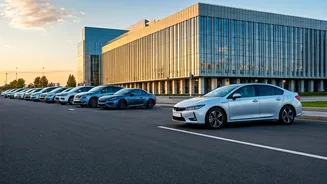Tax Impact Revealed
The implementation of road tax on electric and strong hybrid cars in Uttar Pradesh has significantly changed the landscape of vehicle sales. Before this
change, these vehicles often enjoyed tax benefits, making them an attractive option for buyers. However, with the reintroduction of the tax, the cost advantage has diminished. This financial adjustment has played a key role in the sales decline of these vehicles, as potential buyers now face higher upfront costs, making them re-evaluate their choices. This fiscal measure impacts consumer purchasing behaviour and the wider acceptance of eco-friendly vehicles within the state.
Market Reaction Explained
The market’s response to the road tax has been quite telling. Consumers have begun to weigh the initial cost of these vehicles against the long-term benefits. While electric and hybrid cars offer savings on fuel and lower running costs over time, the increased upfront expense has made them less appealing, particularly for budget-conscious buyers. Furthermore, the limited charging infrastructure available in certain areas of Uttar Pradesh has also prompted some consumers to reconsider their choices. The practical challenges coupled with the financial impact have curbed the initial enthusiasm for these cars and slowed their sales figures across the state, as more traditional fuel-based cars remain attractive due to their lower immediate cost and established infrastructure.
Consumer Choices Analyzed
The shift in consumer preferences has been notable in recent months. Many potential buyers have opted for more conventional petrol and diesel vehicles, primarily due to the lower initial investment required. The reintroduction of the road tax has effectively altered the value proposition of electric and hybrid cars. Buyers now seem to be prioritising the immediate cost savings associated with tried-and-true fuel cars. This trend suggests that price sensitivity is a major driver of vehicle purchases in the region. The accessibility of petrol and diesel models, in addition to their affordability and established infrastructure, has enabled their continued domination of the market, despite the rise of eco-friendly options.
Future Outlook Assessed
Looking forward, the future of electric and hybrid car sales in Uttar Pradesh depends on several factors. Changes in tax policies, such as possible incentives or subsidies, could stimulate demand. Improvements in charging infrastructure are also crucial for increasing the appeal of electric vehicles. Consumer education is another factor: increased awareness of the long-term environmental and economic advantages of these vehicles might encourage wider adoption. For the market to grow, these vehicles must become more financially attractive at the point of sale. This requires a delicate balance of policy changes, infrastructure development, and public awareness to ensure a sustainable transformation in the automotive industry within the state.













